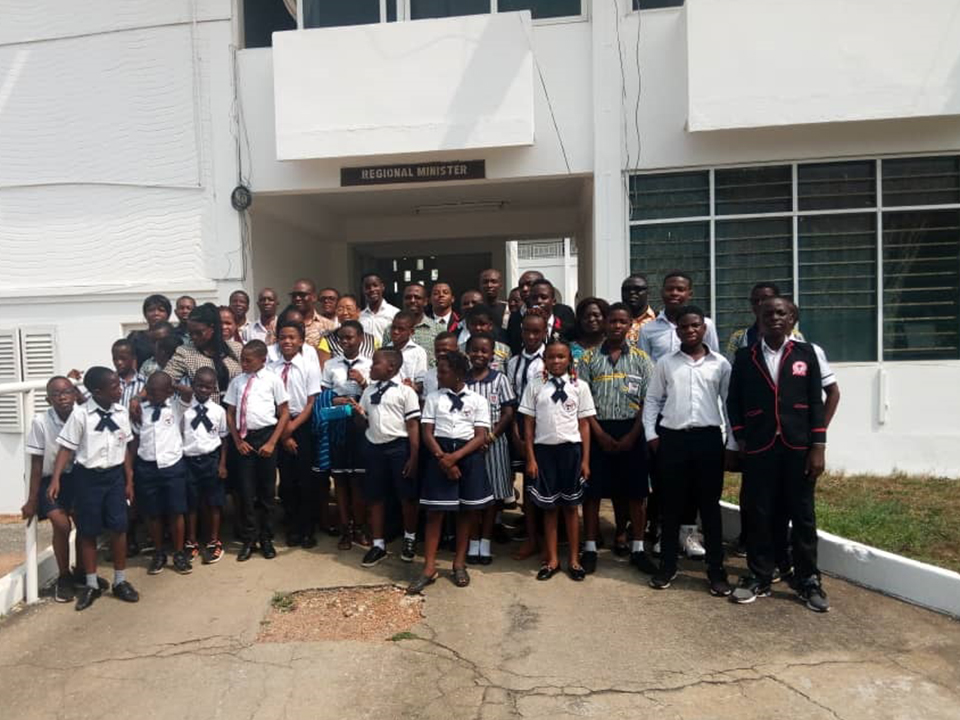The Ghana Investment Fund for Electronic Communications (GIFEC) has presented 30 laptops and accessories to members of the Association of Students with Disabilities in University.
The laptops have been installed with Non-Visual Desktop Access (NVDA) software to make its use simpler for the visually impaired.
In addition to the laptops, GIFEC donated 10 desktop computers and accessories to the Resource Centre for Alternative Media and Assistive Technology (R-CAMAT) to facilitate the training of disabled students in the use of Information Communication and Technology (ICT).
Building Capacity of PWDs
Speaking at the function, the Executive Director of GIFEC, Mr. Kofi Asante, said the donation was to contribute towards equipping disabled students with ICT skills. He indicated that the objective of GIFEC was to bridge the digital divide and provide resource for capacity building in ICT for underserved and unserved populations, including persons with disability (PWD).
Mr. Asante sadi, “GIFEC is committed to partnering educational institutions to build the ICT capacities of PWDs to make their studies less stressful and reduce the dependence of the visually impaired on braille materials to enable them access to a pool of resources with their laptops”. “Graduates now need the capacity in ICT to compete in the global market,” he noted. He said GIFEC has donated ICT equipment to several institutions and indicated that “GIFEC will partner R-CAMAT to equip disabled students to compete favourably in the turbulent job market.
The Deputy Minister for Communications, Mr. Vincent Sowah Odotei, noted that ICT has become a critical component of the world economy. He said training of persons with disability (PWD) was a priority of the government, hence a number of initiatives have been taken in major sectors of the economy.
Mr. Odotei mentioned the introduction of GIFEC Special Digital Literacy Programme (SDLP) which was aimed at modernising, improving and resourcing special training schools to effectively serve the needs of PWDs in the country. He explained that the programme was targeting the distribution of 1,000 digital learning devices to persons with special needs in all the educational levels to equip them with ICT skills so that they would become meaningful individuals to society after completing their education. “This assistive technology which translates visual information into forms are useful to users via non-visual means such as text to speech, sound icons or braille device,” he said.
UCC Partnership with GIFEC and Ministry of Communications
In his address, the Vice-Chancellor, Prof. Joseph Ghartey Ampiah, thanked GIFEC for the donation and also indicated the University’s its readiness to build the capacity of PWD to prepare a pool of trainer of trainees. He said as Vice-Chancellor, his vision was to digitise the entire University adding “the donation of these ICT equipment is directly in line with my vision”.
Prof. Ampiah said the donation was a step in firming up the relationship between UCC , GIFEC and the Ministry of Communications for the betterment of students especially PWDs. "UCC will do everything possible to make life of PWD comfortable on campus stressing that, “UCC is a disability friendly,” he noted.
Introduction of Sign Language Interpretation
The Vice-Chancellor indicated that UCC in collaboration with the Ghana National Association of the Deaf would introduce a course in Sign Language Interpretation in the next academic year. “This course will help the Deaf in the society access tertiary education and enable them get employment in the formal sector
The President of the Association of Students with Disabilities (ASD), Mr. Carruthers Tetteh, expressed appreciation to GIFEC and the Ministry of Communication for the donation. He said the laptops would enhance their studies and help them to access various educational materials as well as building their capacities in ICT.
Mr. Tetteh used the opportunity to call on Management of the University to ensure the full enforcement of the 2012 Disability Policy. He appealed to the Vice-Chancellor to facilitate the construction of a Centre solely dedicated to persons with special needs in the University.

